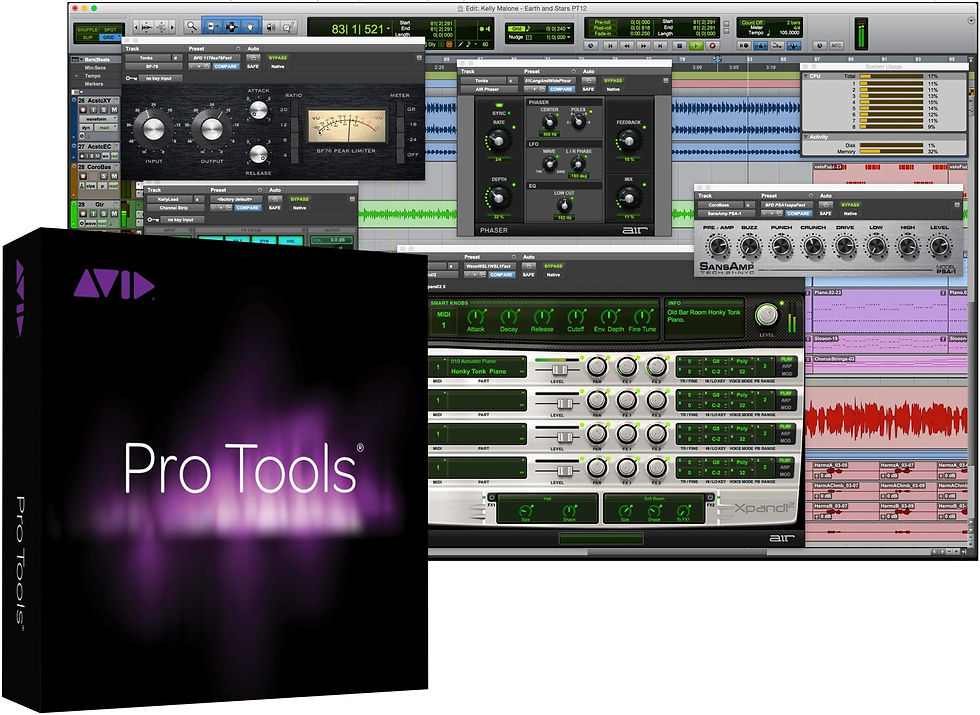The Musician in the Digital Era
- Leon

- Jun 6, 2018
- 6 min read
Updated: Sep 22, 2020

There’s a pretty common term I’m sure all of us have heard: starving artist. There is no denying artists become the bastard children of capitalism from time to time- leaving the proverbial fruit (money) a few branches too high to reach. Why is this?
Monetizing music is difficult and complicated work. Controlled by a lot of people who aren’t the artists themselves. Bad news, the industry is constantly struggling with ways to keep steady cash flow to all the individuals who need it. Good news, there’s never been a better time to be an artist. But how did we get there?

Technology. The digital era of music opened the door to nearly limitless options. To this day, the digital era gets better all the time. Although there were other iterations of Pro Tools before it was released 1991 (DegiDesign & Sound Tools), this is when DAWs began taking hold in the industry. It makes perfect sense too, suddenly a single individual could do things that would normally require more than two hands. No more slicing and aligning tape of the analog era, manual mix actions could be automated within the program and mix downs didn’t require all hands on deck hovering over the console. On top of that, it was affordable compared to an actual mixing console. This made a powerful tool available to anyone serious enough to save a little cash. Suddenly, home studios were becoming a reality and in that same year. The same year that Pro Tools released also happened to be the release of the internet to the public.

Music was now easier than ever to make and easier than ever to share. The digital era bred new genres due to impossibilities of previous musical eras. Limitless precision and possibilities, the future looked bright. As the potential grew and the internet became a prominent tool of the public to share information- it was only a matter of time before music was shared. In 1999 Napster was born. Napster allowed easy peer-to-peer file sharing to friends, which was great, until it wasn’t. Jason Sidell authored an article on pirating’s adverse effect on the industry (linked below) and in it he claims 30 billion songs were illegally downloaded between 2004 and 2009. Sidell also states:
“According to the Recording Industry Association of America, music sales have dropped by 47% ever since Napster made its debut. RIAA, which is made up of large companies that oversee the recording and distribution of music, revealed that the music industry suffered 12.5 billion in losses by 2012 and also disclosed that over 71,000 jobs have been lost. The positions that have had to be cut include people who once worked as songwriters, producers, engineers, technicians, marketing support and artists.”
It’s apparent that the industry was heavily shook by these changing times. The World Wide Web wasn’t just a thief in the night targeting industry wallets- it also happens to be the world’s largest stage. Constant exposure to the largest collective of human attention on the market.
Free publicity.
However, times of hardship also cause innovation, many laid off musicians, engineers and producers found means to making money of their own. Products were made that make creation even easier than it already was. Music was being made more than ever, but less and less people are paying for it. The wheel needed to be re-invented and the demand for music recreated.
In the book “Music in the Marketplace: A Social Economics Approach” Samuel Cameron states, that album sales in the U.S. went from 800 million to 316 million from the year 2002-2012. The decline began during the popularization of torrenting music, illegally, but the killer that was responsible for the decline in sales were... streaming services. There are constant debates between artists, labels and the rest of the industry about where the money should be going. At least, to keep everyone involved as happy as possible. Cameron talks about the happiness level of artists with their streaming dividends and some artists have been particularly vocal about their feelings on the matter.

Radiohead’s Thom Yorke remarked that streaming services (Spotify) were “the last desperate fart of a dying corpse”. Thom was bringing attention to the fact that artists make a minuscule cut of the profit pie. Let’s take a look at the numbers:

Streaming is often viewed as the savior of what remains of the music industry, but is that really the case? In 2018, it seems to be the most difficult year to make a living as an artist. The median share, per streaming service play, is 0.00086 cents per play- that’s less than one ten-thousandth of cent! To make any sort of reasonable or comfortable living (in the city) you’d most likely need somewhere around 3.5 Million hits on your song per month to be comfortable.
Looks like we will be starving artists for quite a while longer…
So, it would seem, being under a label has to be the way to go. How are you going to get that kind of exposure and put food on the table? Is it possible to make a comfortable living as a freelance engineer? Of course it is, and people do it all the time.
Just as with anything in life there are pros and cons to both sides of this profession. There is more of the profit pie to be had if you’re able to find freelance work- the master of your own career (and profit). However, this is a give and take, the more people that leave a dying industry to do their own work, the more the industry dies. This leaves what feels like a monopoly on the rest of the industry, squeezing the lifeblood out of artists to line the pockets of the already well to do- or at least that’s what it can feel like to artists like you and me. If we take a step outside of our feelings (and ignore the individuals who are taking more profit pie than they deserve) you know in your heart everyone needs money. The difference between an industry artist and the independent artist is, care and attention to detail. Big name productions have large teams of people working on the same project. Not leaving any sonic disturbance or issue unturned. Every single person on these teams need to make a living as well.
We’ve already discussed the major con of being an industry artist... money. What are the pros?
The industry artist has more time to focus on their craft. There are teams taking care of mixing, mastering, publicity, marketing, merch, and the list goes on. A record label has a pre-established (large) audience with a guaranteed amount of exposure. You’re likely to make money and probably enough to live off of, but have far less control over the amount of income. Another con to consider is job security in a dying market. The record label model has been around for quite a while and it seems to make sense for an artist who is certain to reach millions of listeners, but the independent side can look rather bleak.
Keep in mind we are strictly talking about streaming revenue and it’s important to not stay stuck on that fact. At least if you want that moolah. There are loads of ways to monetize yourself and a simple search will prove it. As in independent artist it’s far more difficult to build a large and stable audience, but easier to have a far more intimate connection with the audience. The independent artist has more control and a more intimate relationship with the art as well. You are your own boss, meaning you can monetize anyway you like. Patrons, t-shirts, and affiliate marketing are just a few ways to make money as an independent artist. There are even studies about offering your music by donation. This means your fans can get your music completely for free or by any chosen donation. The psychology behind this is sound.

When something is given away for free, especially if the product is enjoyed, psychologically most people feel obligated to pay- sometimes more than they would originally! For years now I’ve followed an artist, Graham Cochrane, who experimented with this concept by releasing his album “What Lies Beyond” for donation. Of course, some gave a big fat $0 but in his post he states, “the total sales income for each 'fan' who downloaded something it comes to average of just over $4 per person.” Graham’s album was an EP for four songs so- he averaged nearly a dollar per song by offering up his music for free while building an audience! Its apparent money can in fact be made on music- it’s just a whole lot of independent work (the con). A ton of work often without a team with the benefit of added creativity.
Concluding these thoughts, how do you feel about the state of the industry? Is it fair? Is there a problem in monetizing the music industry- or does the industry need to change? There are plenty more things to consider but this is a starting point to understanding the challenges facing the music industry today.












Comments